状语从句汉译英
- 格式:doc
- 大小:47.50 KB
- 文档页数:3
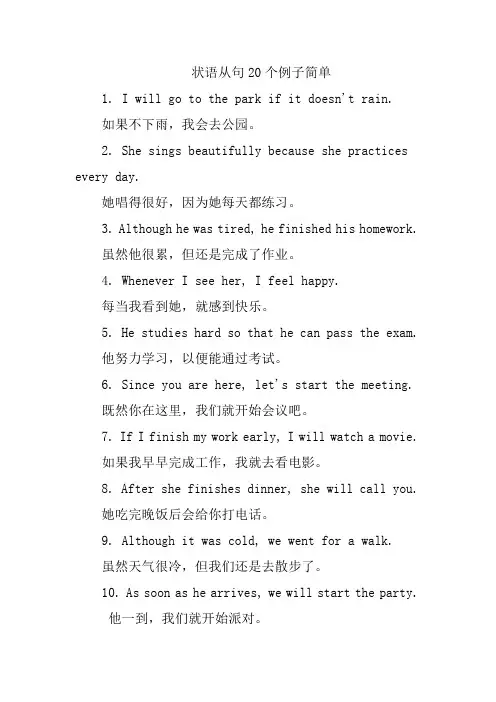
状语从句20个例子简单1. I will go to the park if it doesn't rain.如果不下雨,我会去公园。
2. She sings beautifully because she practices every day.她唱得很好,因为她每天都练习。
3. Although he was tired, he finished his homework.虽然他很累,但还是完成了作业。
4. Whenever I see her, I feel happy.每当我看到她,就感到快乐。
5. He studies hard so that he can pass the exam.他努力学习,以便能通过考试。
6. Since you are here, let's start the meeting.既然你在这里,我们就开始会议吧。
7. If I finish my work early, I will watch a movie.如果我早早完成工作,我就去看电影。
8. After she finishes dinner, she will call you.她吃完晚饭后会给你打电话。
9. Although it was cold, we went for a walk.虽然天气很冷,但我们还是去散步了。
10. As soon as he arrives, we will start the party.他一到,我们就开始派对。
11. Whenever it snows, the children go outside to play.每当下雪,孩子们就会出去玩。
12. Because she was late, she missed the bus.因为她迟到了,所以错过了公交车。
13. Though he is young, he is very wise.虽然他年轻,但很聪明。
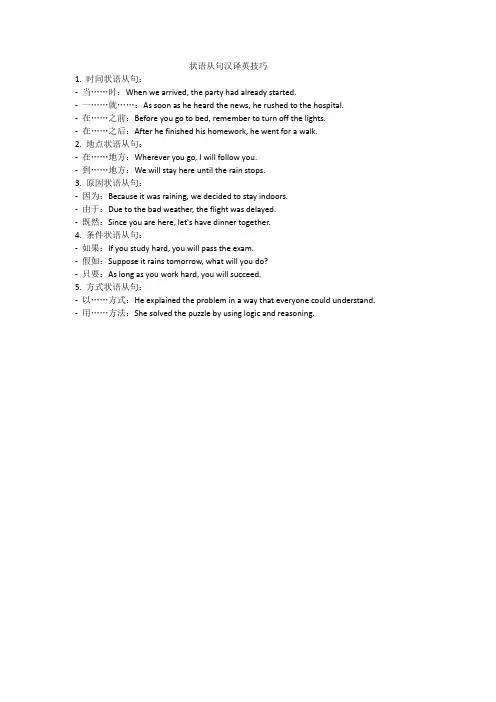
状语从句汉译英技巧1. 时间状语从句:-当……时:When we arrived, the party had already started.-一……就……:As soon as he heard the news, he rushed to the hospital.-在……之前:Before you go to bed, remember to turn off the lights.-在……之后:After he finished his homework, he went for a walk.2. 地点状语从句:-在……地方:Wherever you go, I will follow you.-到……地方:We will stay here until the rain stops.3. 原因状语从句:-因为:Because it was raining, we decided to stay indoors.-由于:Due to the bad weather, the flight was delayed.-既然:Since you are here, let's have dinner together.4. 条件状语从句:-如果:If you study hard, you will pass the exam.-假如:Suppose it rains tomorrow, what will you do?-只要:As long as you work hard, you will succeed.5. 方式状语从句:-以……方式:He explained the problem in a way that everyone could understand. -用……方法:She solved the puzzle by using logic and reasoning.。
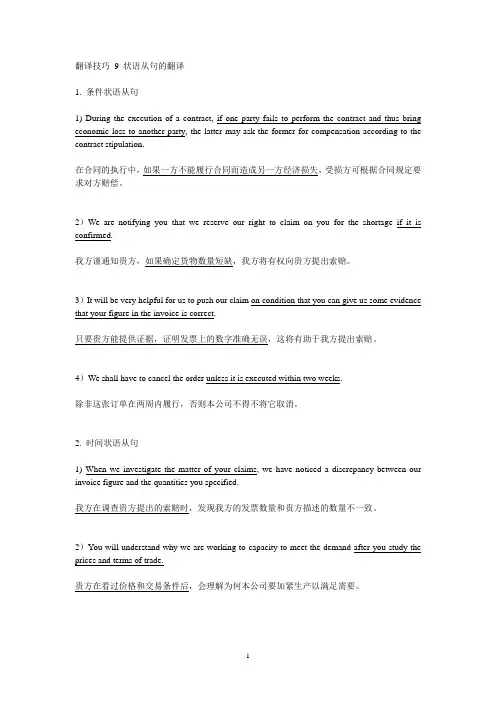
翻译技巧9 状语从句的翻译1. 条件状语从句1) During the execution of a contract, if one party fails to perform the contract and thus bring economic loss to another party, the latter may ask the former for compensation according to the contract stipulation.在合同的执行中,如果一方不能履行合同而造成另一方经济损失,受损方可根据合同规定要求对方赔偿。
2)We are notifying you that we reserve our right to claim on you for the shortage if it is confirmed.我方谨通知贵方,如果确定货物数量短缺,我方将有权向贵方提出索赔。
3)It will be very helpful for us to push our claim on condition that you can give us some evidence that your figure in the invoice is correct.只要贵方能提供证据,证明发票上的数字准确无误,这将有助于我方提出索赔。
4)We shall have to cancel the order unless it is executed within two weeks.除非这张订单在两周内履行,否则本公司不得不将它取消。
2. 时间状语从句1) When we investigate the matter of your claims, we have noticed a discrepancy between our invoice figure and the quantities you specified.我方在调查贵方提出的索赔时,发现我方的发票数量和贵方描述的数量不一致。
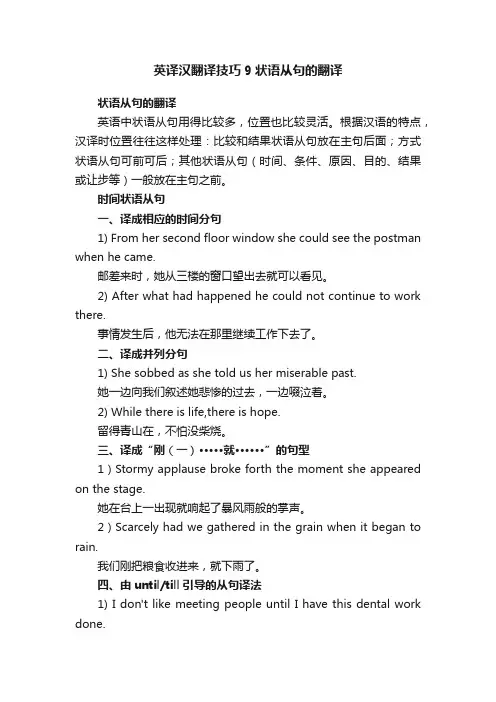
英译汉翻译技巧9状语从句的翻译状语从句的翻译英语中状语从句用得比较多,位置也比较灵活。
根据汉语的特点,汉译时位置往往这样处理:比较和结果状语从句放在主句后面;方式状语从句可前可后;其他状语从句(时间、条件、原因、目的、结果或让步等)一般放在主句之前。
时间状语从句一、译成相应的时间分句1) From her second floor window she could see the postman when he came.邮差来时,她从三楼的窗口望出去就可以看见。
2) After what had happened he could not continue to work there.事情发生后,他无法在那里继续工作下去了。
二、译成并列分句1) She sobbed as she told us her miserable past.她一边向我们叙述她悲惨的过去,一边啜泣着。
2) While there is life,there is hope.留得青山在,不怕没柴烧。
三、译成“刚(一)·····就······”的句型1)Stormy applause broke forth the moment she appeared on the stage.她在台上一出现就响起了暴风雨般的掌声。
2)Scarcely had we gathered in the grain when it began to rain.我们刚把粮食收进来,就下雨了。
四、由until/till引导的从句译法1) I don't like meeting people until I have this dental work done.在我牙齿修补好之前,我不想会客。
分析:主句否定时,把until 当作 before来译。
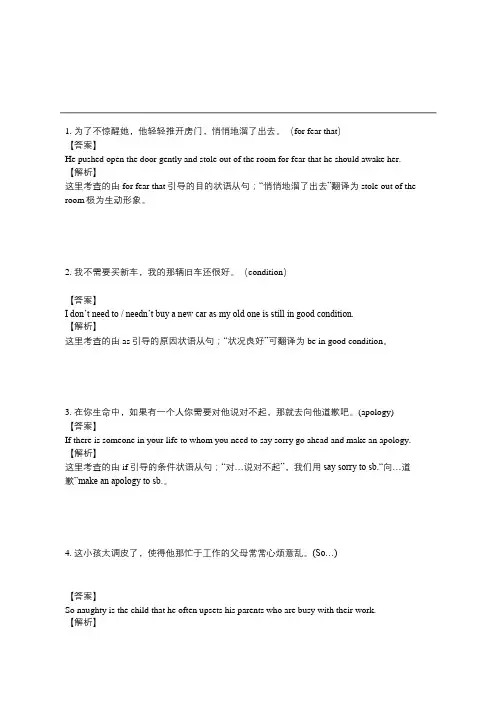
1. 为了不惊醒她,他轻轻推开房门,悄悄地溜了出去。
(for fear that)【答案】He pushed open the door gently and stole out of the room for fear that he should awake her.【解析】这里考查的由for fear that引导的目的状语从句;“悄悄地溜了出去”翻译为stole out of the room极为生动形象。
2. 我不需要买新车,我的那辆旧车还很好。
(condition)【答案】I don’t need to / needn’t buy a new car as my old one is still in good condition.【解析】这里考查的由as引导的原因状语从句;“状况良好”可翻译为be in good condition。
3. 在你生命中,如果有一个人你需要对他说对不起,那就去向他道歉吧。
(apology)【答案】If there is someone in your life to whom you need to say sorry go ahead and make an apology.【解析】这里考查的由if引导的条件状语从句;“对…说对不起”,我们用say sorry to sb.“向…道歉”make an apology to sb.。
4. 这小孩太调皮了,使得他那忙于工作的父母常常心烦意乱。
(So…)【答案】So naughty is the child that he often upsets his parents who are busy with their work.【解析】这里考查的是so…that引导的结果状语从句,千万要注意,so位于句首要用不完全倒装形式。
5. 自从出国留学后,她就不再和我们保持联系了。
(No longer)【答案】No longer has she kept in touch with us since she went abroad for further study / education.【解析】这里考查的是since引导的时间状语从句;与……保持联系keep in touch with;注意no longer位于句首,主句要使用部分倒装结构。
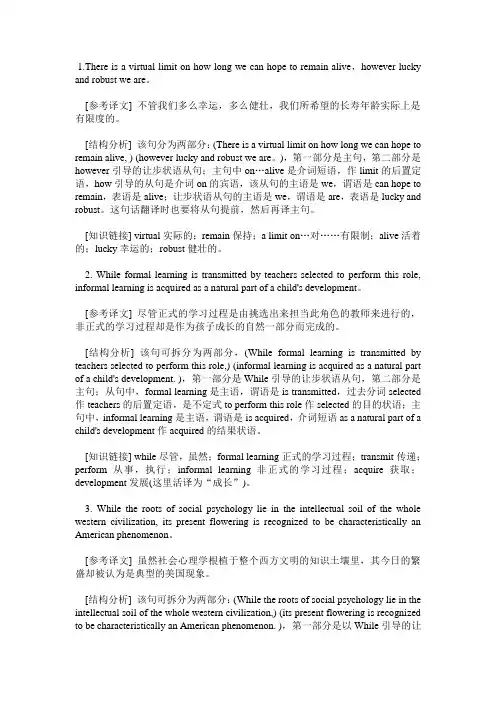
1.There is a virtual limit on how long we can hope to remain alive,however lucky and robust we are。
[参考译文] 不管我们多么幸运,多么健壮,我们所希望的长寿年龄实际上是有限度的。
[结构分析] 该句分为两部分:(There is a virtual limit on how long we can hope to remain alive, ) (however lucky and robust we are。
),第一部分是主句,第二部分是however引导的让步状语从句;主句中on…alive是介词短语,作limit的后置定语,how引导的从句是介词on的宾语,该从句的主语是we,谓语是can hope to remain,表语是alive;让步状语从句的主语是we,谓语是are,表语是lucky and robust。
这句话翻译时也要将从句提前,然后再译主句。
[知识链接] virtual实际的;remain保持;a limit on…对……有限制;alive活着的;lucky幸运的;robust健壮的。
2. While formal learning is transmitted by teachers selected to perform this role, informal learning is acquired as a natural part of a child's development。
[参考译文] 尽管正式的学习过程是由挑选出来担当此角色的教师来进行的,非正式的学习过程却是作为孩子成长的自然一部分而完成的。
[结构分析] 该句可拆分为两部分,(While formal learning is transmitted by teachers selected to perform this role,) (informal learning is acquired as a natural part of a child's development. ),第一部分是While引导的让步状语从句,第二部分是主句;从句中,formal learning是主语,谓语是is transmitted,过去分词selected 作teachers的后置定语,是不定式to perform this role作selected的目的状语;主句中,informal learning是主语,谓语是is acquired,介词短语as a natural part of a child's development作acquired的结果状语。
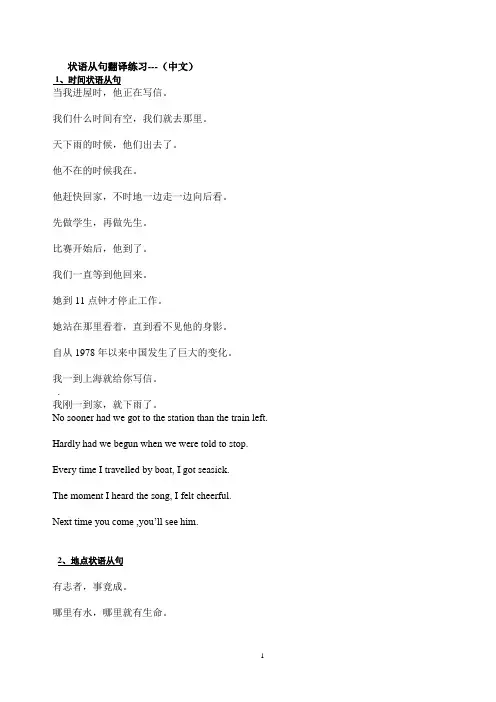
状语从句翻译练习---(中文)1、时间状语从句当我进屋时,他正在写信。
我们什么时间有空,我们就去那里。
天下雨的时候,他们出去了。
他不在的时候我在。
他赶快回家,不时地一边走一边向后看。
先做学生,再做先生。
比赛开始后,他到了。
我们一直等到他回来。
她到11点钟才停止工作。
她站在那里看着,直到看不见他的身影。
自从1978年以来中国发生了巨大的变化。
我一到上海就给你写信。
.我刚一到家,就下雨了。
No sooner had we got to the station than the train left. Hardly had we begun when we were told to stop. Every time I travelled by boat, I got seasick.The moment I heard the song, I felt cheerful.Next time you come ,you’ll see him.2、地点状语从句有志者,事竟成。
哪里有水,哪里就有生命。
你可以随意到你喜欢的任何地方去。
无论你去哪都要遵守法律。
3、原因状语从句昨天我回来晚了,因为我值班。
既然大家都到了,我们开始开会。
As he didn’t know much English, he looked up the word in the dictionary .Now (that) the weather has cleared up, we can start our journey.Seeing (that) he was badly ill, we sent for the doctor.4、目的状语从句I shall write down your telephone number that I may not forget.We’ll tell you the truth so that you can judge for yourself.They worked harder than usual in order that they could finish the work ahead of time .5、结果状语从句我们把收音机的音量放大,大家都听到了新闻。
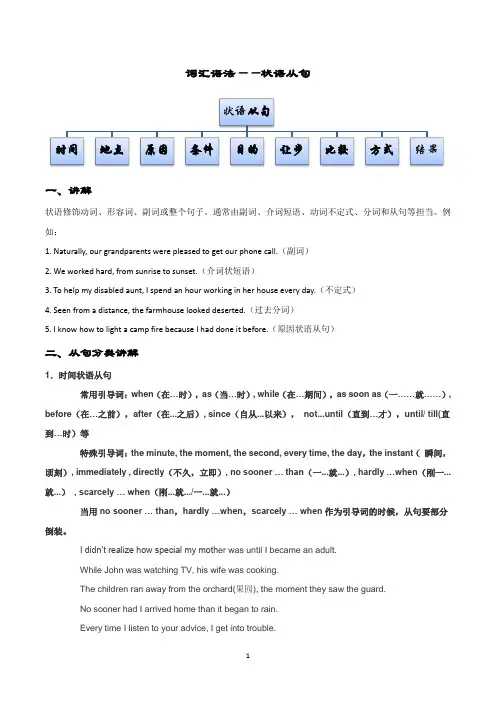
词汇语法——状语从句状语从句时间地点原因条件目的让步比较方式结果一、讲解状语修饰动词、形容词、副词或整个句子。
通常由副词、介词短语、动词不定式、分词和从句等担当。
例如:1. Naturally, our grandparents were pleased to get our phone call.(副词)2. We worked hard, from sunrise to sunset.(介词状短语)3. To help my disabled aunt, I spend an hour working in her house every day.(不定式)4. Seen from a distance, the farmhouse looked deserted.(过去分词)5. I know how to light a camp fire because I had done it before.(原因状语从句)二、从句分类讲解1.时间状语从句常用引导词:when(在…时),as(当…时), while (在…期间),as soon as(一……就……), before(在…之前),after(在...之后), since (自从...以来),not...until(直到…才),until/ till(直到…时)等特殊引导词:the minute, the moment, the second, every time, the day,the instant(瞬间,顷刻), immediately , directly(不久,立即), no sooner … than(一...就...), hardly …when(刚一...就...), scarcely … when(刚...就.../一...就...)当用no sooner … than,hardly …when,scarcely … when作为引导词的时候,从句要部分倒装。
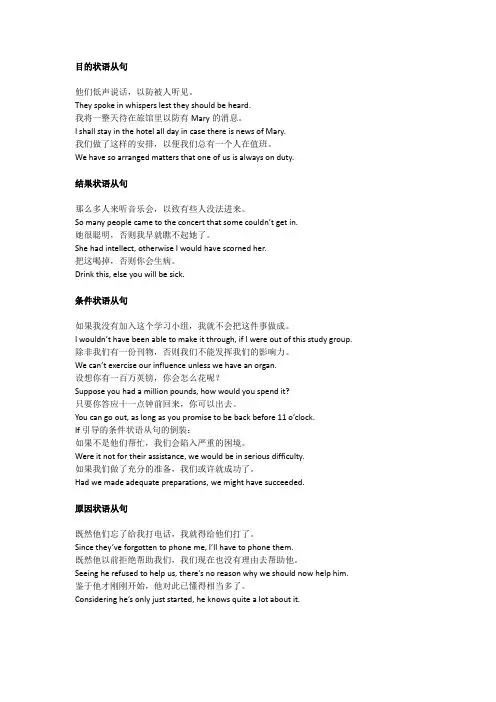
目的状语从句他们低声说话,以防被人听见。
They spoke in whispers lest they should be heard.我将一整天待在旅馆里以防有Mary的消息。
I shall stay in the hotel all day in case there is news of Mary.我们做了这样的安排,以便我们总有一个人在值班。
We have so arranged matters that one of us is always on duty.结果状语从句那么多人来听音乐会,以致有些人没法进来。
So many people came to the concert that some could n’t get in.她很聪明,否则我早就瞧不起她了。
She had intellect, otherwise I would have scorned her.把这喝掉,否则你会生病。
Drink this, else you will be sick.条件状语从句如果我没有加入这个学习小组,我就不会把这件事做成。
I wouldn’t have been able to make it through, if I were out of this study group. 除非我们有一份刊物,否则我们不能发挥我们的影响力。
We can’t exercise our influence unless we have an organ.设想你有一百万英镑,你会怎么花呢?Suppose you had a million pounds, how would you spend it?只要你答应十一点钟前回来,你可以出去。
You can go out, as long as you promise to be back before 11 o’clock.If引导的条件状语从句的倒装:如果不是他们帮忙,我们会陷入严重的困境。
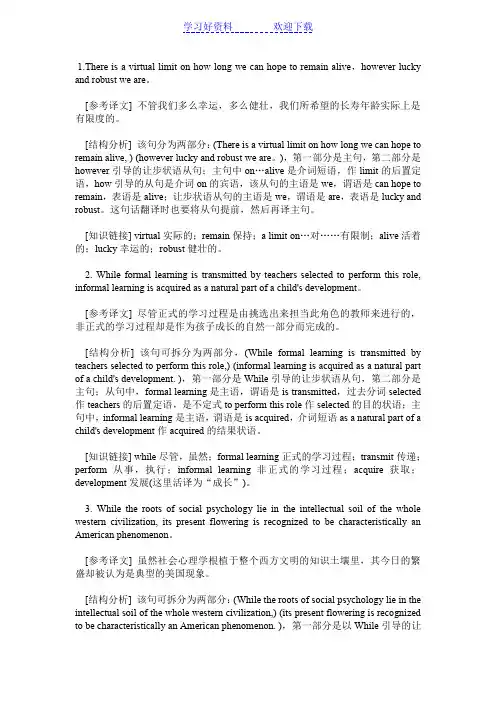
1.There is a virtual limit on how long we can hope to remain alive,however lucky and robust we are。
[参考译文] 不管我们多么幸运,多么健壮,我们所希望的长寿年龄实际上是有限度的。
[结构分析] 该句分为两部分:(There is a virtual limit on how long we can hope to remain alive, ) (however lucky and robust we are。
),第一部分是主句,第二部分是however引导的让步状语从句;主句中on…alive是介词短语,作limit的后置定语,how引导的从句是介词on的宾语,该从句的主语是we,谓语是can hope to remain,表语是alive;让步状语从句的主语是we,谓语是are,表语是lucky and robust。
这句话翻译时也要将从句提前,然后再译主句。
[知识链接] virtual实际的;remain保持;a limit on…对……有限制;alive活着的;lucky幸运的;robust健壮的。
2. While formal learning is transmitted by teachers selected to perform this role, informal learning is acquired as a natural part of a child's development。
[参考译文] 尽管正式的学习过程是由挑选出来担当此角色的教师来进行的,非正式的学习过程却是作为孩子成长的自然一部分而完成的。
[结构分析] 该句可拆分为两部分,(While formal learning is transmitted by teachers selected to perform this role,) (informal learning is acquired as a natural part of a child's development. ),第一部分是While引导的让步状语从句,第二部分是主句;从句中,formal learning是主语,谓语是is transmitted,过去分词selected 作teachers的后置定语,是不定式to perform this role作selected的目的状语;主句中,informal learning是主语,谓语是is acquired,介词短语as a natural part of a child's development作acquired的结果状语。
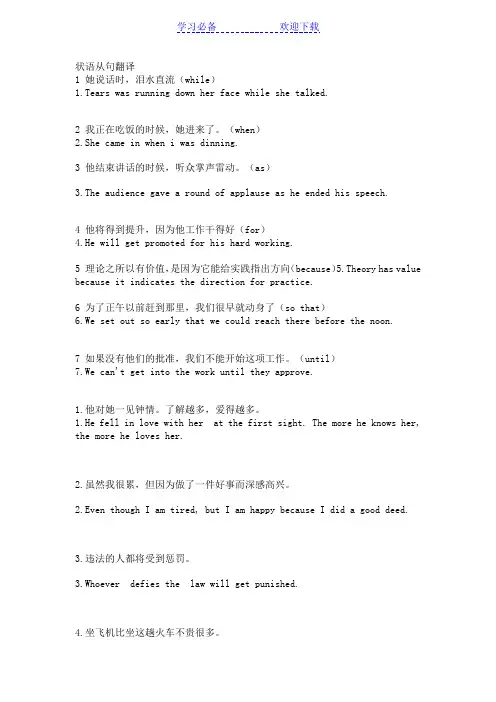
状语从句翻译1 她说话时,泪水直流(while)1.Tears was running down her face while she talked.2 我正在吃饭的时候,她进来了。
(when)2.She came in when i was dinning.3 他结束讲话的时候,听众掌声雷动。
(as)3.The audience gave a round of applause as he ended his speech.4 他将得到提升,因为他工作干得好(for)4.He will get promoted for his hard working.5 理论之所以有价值,是因为它能给实践指出方向(because)5.Theory has value because it indicates the direction for practice.6 为了正午以前赶到那里,我们很早就动身了(so that)6.We set out so early that we could reach there before the noon.7 如果没有他们的批准,我们不能开始这项工作。
(until)7.We can't get into the work until they approve.1.他对她一见钟情。
了解越多,爱得越多。
1.He fell in love with her at the first sight. The more he knows her, the more he loves her.2.虽然我很累,但因为做了一件好事而深感高兴。
2.Even though I am tired, but I am happy because I did a good deed.3.违法的人都将受到惩罚。
3.Whoever defies the law will get punished.4.坐飞机比坐这趟火车不贵很多。
1. 为了不惊醒她,他轻轻推开房门,悄悄地溜了出去。
(for fear that)【答案】He pushed open the door gently and stole out of the room for fear that he should awake her.【解析】这里考查的由for fear that引导的目的状语从句;“悄悄地溜了出去”翻译为stole out of the room极为生动形象。
2. 我不需要买新车,我的那辆旧车还很好。
(condition)【答案】I don’t need to / needn’t buy a new car as my old one is still in good condition.【解析】这里考查的由as引导的原因状语从句;“状况良好”可翻译为be in good condition。
3. 在你生命中,如果有一个人你需要对他说对不起,那就去向他道歉吧。
(apology)【答案】If there is someone in your life to whom you need to say sorry go ahead and make an apology.【解析】这里考查的由if引导的条件状语从句;“对…说对不起”,我们用say sorry to sb.“向…道歉”make an apology to sb.。
4. 这小孩太调皮了,使得他那忙于工作的父母常常心烦意乱。
(So…)【答案】So naughty is the child that he often upsets his parents who are busy with their work.【解析】这里考查的是so…that引导的结果状语从句,千万要注意,so位于句首要用不完全倒装形式。
5. 自从出国留学后,她就不再和我们保持联系了。
(No longer)【答案】No longer has she kept in touch with us since she went abroad for further study / education.【解析】这里考查的是since引导的时间状语从句;与……保持联系keep in touch with;注意no longer位于句首,主句要使用部分倒装结构。
原因状语从句I.because,since,as1.因为他诚实,所以他的朋友喜欢他。
2.他的朋友喜欢他是因为他诚实。
3.既然大家都到了,我们可以动身了。
4.既然你需要这本书,你可以拿走。
5.他因为拒绝说慌而丢了工作。
6.因为他工作不努力所以又失败了。
II.now that1.既然大家都到了,我们可以开始讨论了。
2.既然你已经康复了,你就可以回去工作了。
.I II.seeing that,considering that1.他既然是小孩,让他单独去是不安全的。
2.因为他是第一次迟到,所以老师让他通过了。
条件状语从句I.if,unless1.如果我回去晚了,妈妈会生气的。
2.如果你愿意,你可以试一试。
3.除非明天下雨,不然我是要去的。
4.除非我们现在出发,不然我们就迟到了。
II.suppose,supposing1.假如下雨了,你将怎么办?2.假如他邀请你,你去吗?III.on condition that,so long as1.只要你不离开河岸太远,你可以去游泳。
2.只要你答应不去赌博(go gambling),我就同意把钱借给你。
3.只要你保持安静,你可以留在此地。
让步状语从句I.as1.他虽然疲劳但仍在工作。
2.他虽然是个英雄,但也有一些缺点。
3.他虽然年轻但懂得很多。
II.even if,even though1.即使你付钱给我,我也不愿做着事。
III.whether or not,whether…or…(not)1.不管这是否是最好得计划,他们都必须执行。
2.不管你是否愿意,你必须把它做好。
IV.wh-ever, no matter wh-1.不论怎么做,这件事都将是错误的。
2.不管他是谁,不要给他开门。
3.无论你做什么,你必须尽力而为。
5. 无论发生什么事,不要改变主意。
6. 不管工作有多么困难,我们必须按时完成。
目的状语从句I . so that (will,shall,may,can),in order that (may,shall)1.他把我的鞋拿走了,这样我就不能离开屋子了。
状语从句翻译1 她说话时,泪水直流(while)1.Tearswas runnin g down her face whileshe talked.2 我正在吃饭的时候,她进来了。
(when)2.She came in when i was dinnin g.3 他结束讲话的时候,听众掌声雷动。
(as)3.The audien ce gave a roundof applau se as he endedhis speech.4 他将得到提升,因为他工作干得好(for)4.He will get promot ed for his hard workin g.5 理论之所以有价值,是因为它能给实践指出方向(becaus e)5.Theory has valuebecaus e it indica tes the direct ion for practi ce.6 为了正午以前赶到那里,我们很早就动身了(so that)6.We set out so earlythat we couldreachtherebefore the noon.7 如果没有他们的批准,我们不能开始这项工作。
(until)7.We can't get into the work untilthey approv e.1.他对她一见钟情。
了解越多,爱得越多。
1.He fell in love with her at the firstsight.The more he knowsher, the more he lovesher.2.虽然我很累,但因为做了一件好事而深感高兴。
2.Even though I am tired, but I am happybecaus e I did a good deed.3.违法的人都将受到惩罚。
状语从句翻译目的、结果状语从句1.这个外国人以手势助说话,这样他就能使听众明白他的意思。
(so that)2.这位退休教师家住的离学校那么远,我们很少能见到他。
(so….. that)3.我说了什么使他竟然对我那么生气?(that)4.他发音进步很快,英语已经读得非常漂亮。
(such… that)5.大象有强壮的身躯可以为人干重活。
(so… that)6.老师劝我们多带衣服以防天气转冷。
(in case)7.为了不被人轻易认出,这些影星们穿着便装。
(in order that)8.这部有关第一次世界大战的历史小说引人入胜,我简直爱不释手(so… that)。
(上海市高考题)地点状语从句1.他在前天掉的地方找到了他的手机。
(where)2.在涉及到公司的利益之处,我们绝不可能轻易放弃。
(where)3.此后无论何时他有机会,他就会同她说话。
(whenever)4.哪儿有病人和苦难,哪儿就有红十字会的工作人员。
(wherever)让步状语从句1.尽管我承认问题很难,我不同意说它们不能解决。
(while)2.无论我给他们多少忠告,他还是一意孤行。
(no matter how)3.即使我们旅行后很累了,我们仍情绪高昂。
(Even if)4.尽管他喜欢布朗教授的讲课,但不喜欢他的举止。
(though)5.无论你有可能说什么,我都会毫不犹豫地帮助她克服困难。
(whatever)6.这个工人无论怎样努力,他似乎总是不能把工作做得令人满意。
(however)7.不论你是冬天来还是夏天来,你都会觉得这是个居住的好地方。
(whether…or…)8.不管我何时打电话请求帮助,他都会马上来我家。
(whenever)9.今晚无论是谁来串门,告诉他我不到十点钟是不会回来的。
(whoever)10.虽然并不富裕,但是他对自己的生活相当满意。
(Although)(上海市高考题)。
状语从句翻译1.除非我们保持快速的经济增长,否则我们无法缩小我国与发达国家的差距。
(maintain)2. 虽然他已制订了不玩游戏的目标,我想他很难改掉这个坏习惯,因为他打网络游戏有瘾。
(obsessively)3. 只要目的明确、努力工作,你所做的贡献迟早会得到承认。
(recognize)4. 虽然目标未达到,但是一个良好的基础已经奠定,因为能源节约问题受到前所未有的关注。
(unprecedented)5. 为了迎合公众的需求,室内体育馆将在老房子被拆迁掉的地方新建。
(the public)6. 虽然做志愿者意味着没有收入,但是就你从帮助别人中得到的满足而言,这工作还是很有价值的。
(in terms of)7. 当我成年时,我父母除了给我更多责任外,也给了我更多自由。
(responsibilities)8. 如果他开不起玩笑,那么意味着别人开他玩笑时他会生气。
(joke)9. 汤姆付完账单后,可开支的钱所剩无几。
(disposable)10. 如果你能领会老师给的有关即将来临的测验的暗示,你肯定能考出好成绩。
(hints)11. 虽然小胖子在运动会上未赢得比赛,但他仍然是一个我们心中钦佩和尊敬的人,因为他不放弃,表现出了良好的运动员精神。
(sportsmanship)12. 不入虎穴,焉得虎子。
(a tiger’s den)13. 她在这部电影中演得很出色,被提名为最佳女演员。
(nominate)14. 只要学生积极参与课堂和课外活动,他们在学业上取得迅速进步就是可以预期的。
(academic progress)15.虽然你已吸取了过去的教训,并获得许多有用的紧急方法,但是情况已经发生了变化,历史将不会重演。
(alter)16. 像热熔化冰一样,水溶化盐。
(dissolve)17. 无论你信不信,时尚会随着时间的变化而变化。
(style)18. 一般来说,按照说明书来服用,这药没有副作用。
(drug)19. 这赝品画得很好,它常被误认为是原作。
原因状语从句
I.because
1.因为他诚实,所以他的朋友喜欢他。
2.他的朋友喜欢他是因为他诚实。
II.now that
1.既然大家都到了,我们可以开始讨论了。
2.既然你已经康复了,你就可以回去工作了。
.
条件状语从句
I.if,unless
1.如果我回去晚了,妈妈会生气的。
2.如果你愿意,你可以试一试。
3.除非明天下雨,不然我是要去的。
4.除非我们现在出发,不然我们就迟到了。
II.so long as
1.只要你不离开河岸太远,你可以去游泳。
2.只要你答应不去赌博(go gambling),我就同意把钱借给你。
3.只要你保持安静,你可以留在此地。
让步状语从句
I.even if,even though
1.即使你付钱给我,我也不愿做着事。
II.whether or not,whether…or…(not)
1.不管这是否是最好得计划,他们都必须执行。
2.不管你是否愿意,你必须把它做好。
IV.wh-ever, no matter wh-
1.不论怎么做,这件事都将是错误的。
2.不管他是谁,不要给他开门。
3.无论你做什么,你必须尽力而为。
5. 无论发生什么事,不要改变主意。
6. 不管工作有多么困难,我们必须按时完成。
V .though\although
1.他虽然很累,但很开心,
2.他虽然很穷,但乐于助人。
目的状语从句
I . so that (will,shall,may,can)
1.他把我的鞋拿走了,这样我就不能离开屋子了。
2.我给他一把钥匙,以便他可以随时进入房间。
3.他起得很早,为的是能赶上头班汽车。
结果状语从句
II.so…that, such…that, so that
1.他非常生气,以至于说不出话来。
2.他太激动了,结果无法入睡。
3.他讲得很清楚,所以人人都能听得懂。
4.他是一个自私的人,所以没人愿意与他为友。
地点状语从句
1.我住的地方有很多商店。
2.没有水的地方就没有农事(farming)。
3.把药放在你能容易拿得到的地方。
4.我们愿意到人民需要我们的地方去。
5.有志者,事竟成。
方式状语从句
I.as
1.想按照他被告之的那样去做。
2.我要按老师教的那样做练习。
II.as if,as though
1.他看上去好像在生病。
2.他张开嘴好像要说话的样子。
3.她微笑着好像再做一场甜蜜的梦(dream )。
时间状语从句
Ⅰ.When:
1.他看到我就哭了。
2.我做完作业就来。
3.当我们在看电视时,他走进了房间。
4.他开始给老板干活时,年进十岁。
5.我进去时,他在听收音机。
6.我到家时,爸爸在做晚饭。
7.当消防队员到那里时,火已被扑灭了。
II.before ,after连词前可加just, right, a long time , soon, three days等。
1.他的父亲在他出生之前就死了。
2.做完作业后你可以休息一下。
3.我们在火车到达之前就等了很久了。
4.电影开始十分钟后他们才到。
5.出院不久后他就开始工作了。
6.我们在晚会开始前十分钟到达。
7.不久我就看到我的错误了。
8.过了很久他才回来。
9.我们再见面要过几年。
10.不久他就动身到南方去了。
Ⅵas soon as
1.他一来我就通知你。
2.他一离开她就开始哭了起来。
3.他一来到教室,就开始读英语。
4.我一到家,天就开始下起雨来。
5.你的信一到,我就立刻动身了。
6.我一看到你就知道你在生我的气。
7.到了那里就给我写信。
Ⅷ. till , until
1.直到半夜他才回来。
2.你可以一直呆到雨停。
3.车停了再下。
4.妈妈回来他才上床睡觉。
5.直到雨停了,我们才发现狗失踪了。
VIII. Every time\each time\the\first\ the last time
1.一见钟情。
2.每当我处于困境,你总是帮助我。
3.每次我遇到难题的时候,我总是抄你的作业。